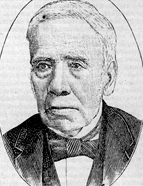

In 1843, he returned to the Navy Secretariat and was appointed Head of the Angola Office but he resigned with the Regeneration. Between 1853 and 1854, he was deputy for the colony of Angola. In 1856 he was appointed Head of the Mozambique Office and then in 1858, he moved up to become Head of the Navy Section. In 1865 Sá da Bandeira appointed him, by decree, to be an extraordinary member of the overseas provinces council as a reward for services rendered during his professional life in the field of overseas policy. He was responsible for some important decisions such as extending the Portuguese territory in Angola to the south (Moçamedes) and to the north (Ambriz), thereby thwarting the ambitions of the British. In 1867, he retired at the age of 65. Despite already having published some books, it was from this time on that he began to devote all his time to historical narratives, writing thousands of pages. He lived austerely and must have amassed a large fortune. As he had no children, he left his worldly goods to various institutions and monumental works - Casa Pia, the Misericórdias [charitable institutions], the Tombs of Vasco da Gama and Luís de Camões, the Monument to Afonso de Albuquerque, and others (“Testamento” in Brito Aranha, Dicionário Bibliográfico Português, tomo XIX, pp.226-232).
Soriano started writing in 1830 as a journalist for the weekly periodical Crónica da Terceira at the service of the Provisional Junta set up in the Azores. It was he who was responsible for the first twelve issues until he was removed owing to certain misunderstandings with the Duke of Palmela. In 1832, still on Terceira, he became the editor and a collaborator of a 143-page publication called Folhinha da Terceira. The same year a small volume of poetry entitled Poesias Diversas de Simão José da Luz, voluntário, emigrado e académico de Coimbra (Diverse Poems of Simão José da Luz, volunteer, emigré and academic of Coimbra) was also published. This was a series of anti-Miguelist odes, songs and sonnets, some of which were dedicated to his companions or to persons of note such as Sá Nogueira.
As part of his duties as a ministerial functionary, he wrote two memoirs: Memória sobre os sertões e a costa ao sul de Benguela na Província de Angola (Memoir on the hinterland and the coast to the south of Benguela in the Province of Angola) (1846) and Memória concernente a sustentar a opinião dos que julgam contagiosa a cólera-morbus epidémica (Memoir to uphold the opinion of those who judge epidemic cholera-morbus to be contagious) (1848).
